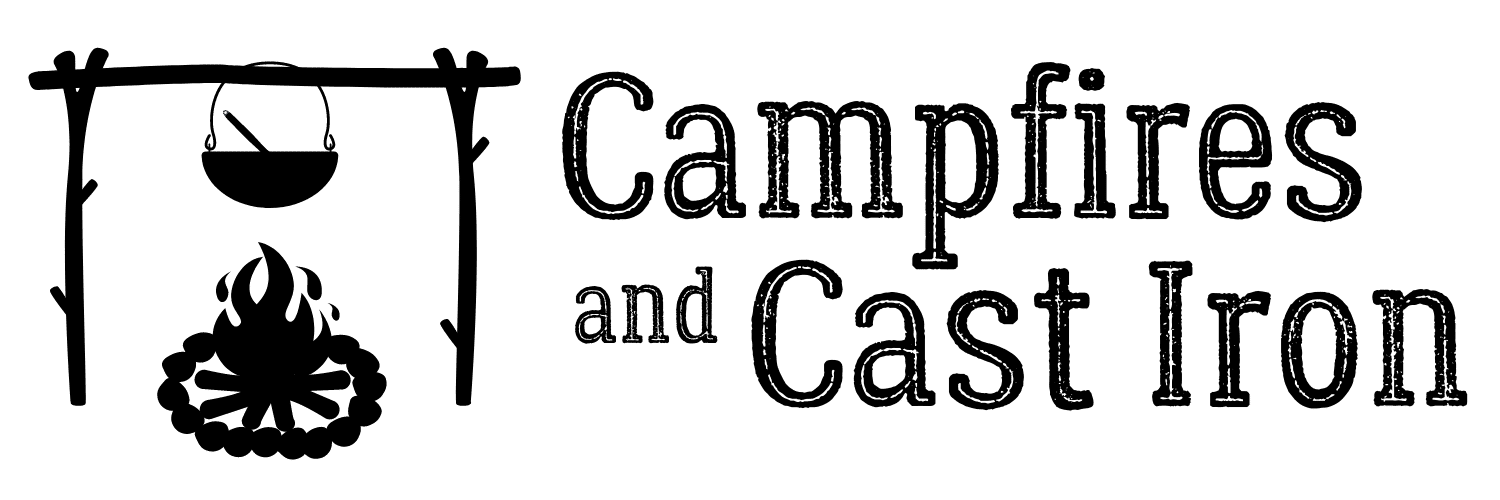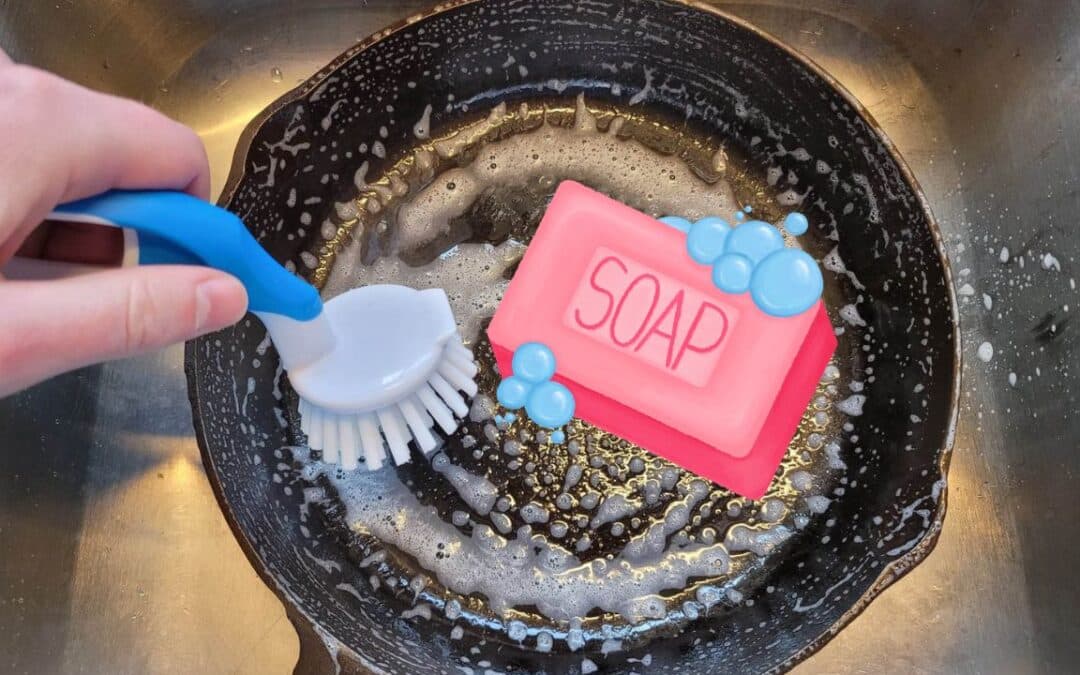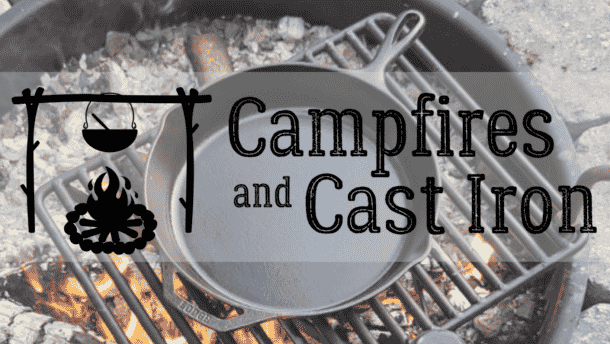It’s one of the most frequently searched questions on the internet – “Can you wash cast iron with soap?” Conflicting advice from several reputable sources makes it hard to know if using soap on cast iron cookware really is okay or not. As someone who restores cast iron, I get asked this question on a weekly basis. Here’s my answer to the “Is soap safe for cast iron” debate:
In short, yes, it is safe to wash cast iron cookware with mild dish soap or castile soap. However, avoid strong degreasing soaps and detergents to prevent damaging your pan’s seasoning layer. Scrub lightly with a dish brush, rinse and dry well, and apply a thin coat of oil to the pan after washing.
In this article, I’ll show you:
- The history behind not using soap on cast iron
- Which soaps are best for cast iron
- Which soaps to avoid, and
- Why cast iron is sanitary even if it’s not washed with soap
Avoiding Soap On Cast Iron: The History Behind The Tradition
You’ve probably heard that it’s not safe to wash cast iron with soap. Or maybe you grew up hearing it from your parents or grandparents. Wherever you heard it from, you knew that using soap on a cast iron pan was a cardinal sin you didn’t dare commit.
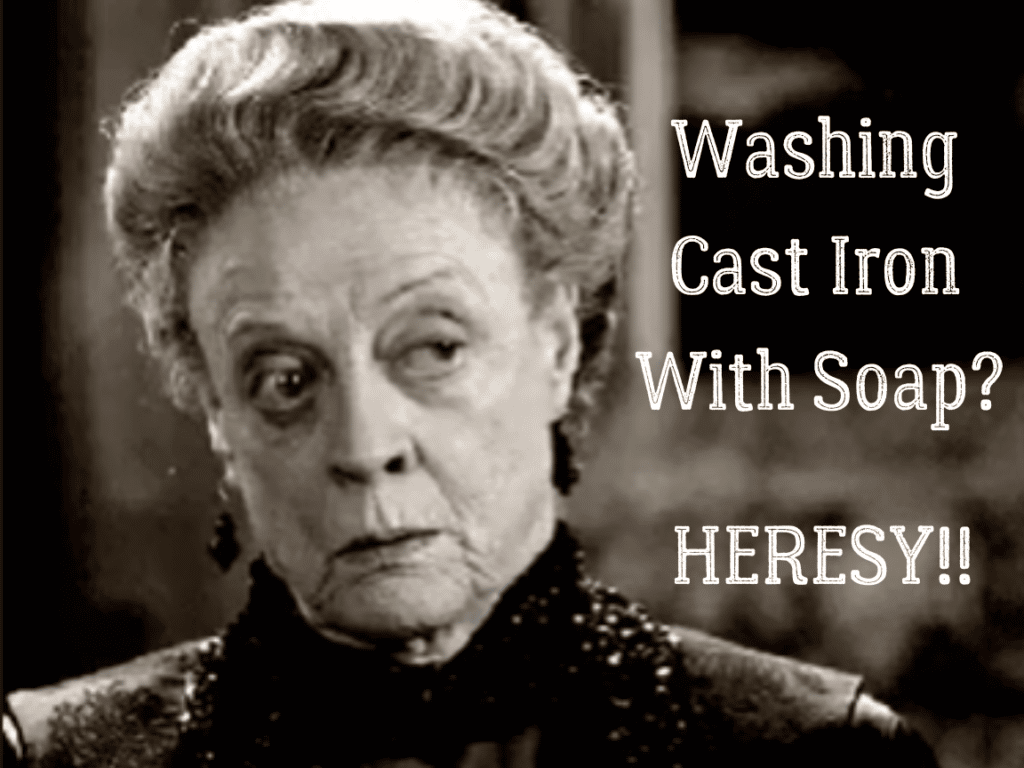
But where did that tradition come from? Lots of people nowadays use soap to wash their cast iron pans and claim it’s perfectly safe. So, who’s right?
Early Soapmaking Methods
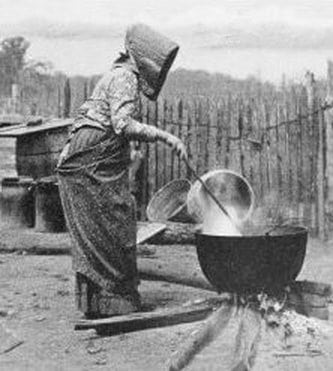
Several generations ago, soap was made using homemade lye. The lye was made by boiling hardwood ashes from the fire with water, which resulted in an “extremely strong alkaline substance that was considered ready when it would dissolve a chicken feather. The caustic wood ash solution was then mixed with fat rendered from butchered animals and boiled over an outdoor fire for many hours until a soft soap was formed.” (Source)
As you can imagine, this primitive soapmaking method didn’t allow for standardized measurements or consistent concentrations of each ingredient. This meant there was no way to accurately control the strength of the final soap product. In fact, sometimes the lye ratio was too high and it didn’t properly neutralize during the remainder of the soapmaking process. You’ll see why this is important in the next section.
What Is Lye? Why Is It Harmful To Cast Iron Seasoning?
Now that we know how lye and primitive soap were made, let’s take it a step further: What, exactly, does lye do, and what does it have to do with cast iron seasoning?
Lye is composed of either potassium or sodium hydroxide, and is defined by Webster as, “A strong alkaline liquor rich in potassium carbonate leached from wood ashes and used especially in making soap and washing.” In its purest form, lye will dissolve anything organic, as evidenced by the “chicken feather test” mentioned above.
The seasoning on cast iron is simply a layer of oil or fat that has undergone a heat-induced chemical reaction called polymerization, which causes it to bond with the iron on a molecular level. Since the oil or fat used to season cast iron is an organic substance, it is subject to being dissolved by lye. In fact, a lye bath is commonly used to strip cast iron down to bare metal prior to re-seasoning it.
Here’s where it all ties together: Because the homemade soaps of the past usually contained high concentrations of lye, they were potentially much more caustic than today’s soaps. Washing cast iron with this primitive soap would almost guarantee that some, if not all of the seasoning, would be damaged or removed. Hence, the “Don’t use soap on cast iron!” warning.
Do Modern Soaps Contain Lye?
All modern soaps, both liquid and solid, are made using lye. I know this might sound shocking, but keep reading. It’s not as bad as it sounds!
If lye was not used to make soap, saponification, the process that converts fats, oils, or lipids into soap by combining them with sodium hydroxide (lye), would not occur and you’d be left with liquid oil that would be useless for cleaning.
However, during the saponification process, the acid (fats or oils) and the base (lye) are neutralized and no actual lye remains in the final soap product.
Will Soap Ruin Cast Iron?
The short answer is, no, soap will not ruin cast iron. Certain soaps are stronger than others or contain harsh degreasers. Choose a mild dish soap without strong degreasers or detergents to preserve the natural seasoning oils on your cookware.
If you notice your pan starting to appear dull grey, rusty, or it just looks dry after washing it with soap, don’t worry. Simply re-season it in the oven to fix the problem.
I also advise people not to use soap EVERY time they wash their cast iron. Many times, the pan can simply be wiped out with a paper towel or gently scrubbed just using warm water. This will help extend the life of your seasoning.
Best Soaps For Cleaning Cast Iron
There are so many dish soaps available these days. How do you know which ones are okay to use on cast iron?
As someone who restores multiple pieces of cast iron cookware each week, you can bet I’ve tried several types of dish soap. Over the years, these have become my favorites. They are gentle on the seasoning layer and do a good job of removing grease and food residue.
- Castile Soap (unscented)
- Caron & Doucet Cast Iron Soap
- ECOS Free & Clear Liquid Dish Soap
- Clark’s Cast Iron Soap
- Nature’s Promise Free & Clear Liquid Dish Soap
- Palmolive Pure + Clear Liquid Dish Soap
It’s also important to note that cast iron can retain fragrances from dish soaps. Some time ago, I was cooking a chicken dish in my freshly washed skillet. At dinnertime, my husband and I both looked up from our meals with surprised looks and wrinkled noses. The chicken had a distinctively different taste, and not in a good way. Through the savory herbs and spices emerged another flavor – citrus dish soap. Although I had thoroughly rinsed the skillet after washing it, the scent from the soap remained in the iron. Needless to say, we ended up having frozen pizza for dinner that night.
I’ll never forget that dish soap-flavored chicken. For this reason, I always recommend using unscented soap. Trust me, it really makes a difference!
Avoid Using These Soaps On Cast Iron
Here are some of the soaps I advise staying away from when washing cast iron. They’re just too strong and can damage or wear away the seasoning layer with repeated washes.
- Dawn Ultra, Platinum, or Powerwash
- Ajax Super Degreaser
- Palmolive Oxy Power Degreaser
- Joy Ultra Degreaser
- Gain Ultra Dishwashing Liquid
- Anything with the description “super,” “ultra,” or “power” degreaser
It’s also a good idea to avoid using homemade soaps on your cast iron. If any unreacted lye remains in the soap, it can damage the seasoning layer.
Can You Put Cast Iron In The Dishwasher?
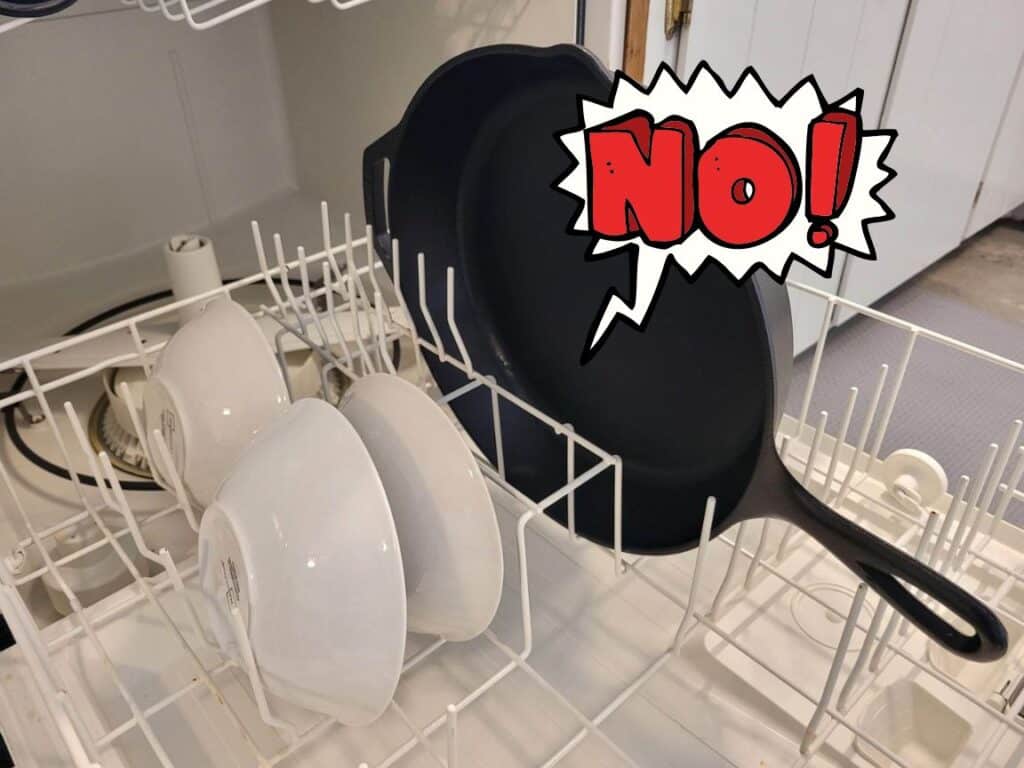
Whatever you do, please don’t put your cast iron pan in the dishwasher! The enzymes in most new detergents and the phosphates in older detergents actually eat away at organic material, breaking down proteins, fats, and starches to clean your dishes (Source). These cleaning agents would have no problem eating away at a cast iron pan’s seasoning layer. Your cookware would emerge looking like a streaky, rusty mess that would require a full strip and re-season treatment.
Should Cast Iron Be Washed After Every Use?
No, cast iron cookware doesn’t have to be washed after every use. This is especially true if the pan was only used to cook something light without greasy residue. In this case, simply wipe it clean with a paper towel and your pan is good to go.
If there is grease or food residue, scrape it out with a spatula or nylon scraper tool. Then, wash the pan with warm water and a dish sponge. Dish soap is optional. I tend to use dish soap about every other wash, or if I’ve cooked something with a strong flavor or smell that I don’t want to linger in my pan.
After washing, dry your cast iron well with a towel. Apply a light coat of oil to the cooking surface and buff it off with a cloth to prevent stickiness. Your pan is now clean, oiled, and ready to be stored or used again soon.
For more information on cleaning cast iron and removing difficult stuck-on food, check out this article: Cast Iron Cookware: Should You Wash It After Every Use?
Is Cast Iron Sanitary If You Don’t Wash It Between Uses?
Are cast iron pans sanitary – are they truly clean and safe to cook with – if you don’t wash them with soap between uses? Actually, yes!
The secret to clean and sanitized cast iron cookware without using soap is really quite simple: Heat. Just like it’s essential to cook meat to a high internal temperature for food safety, usually 145 to 165°F depending on the type of meat, it’s important to heat cast iron cookware to similar temperatures to kill any bacteria that may remain on the pan after cooking and rinsing it out.
Check out my article, Are Cast Iron Pans Sanitary? The Science Behind The Answer to see the interesting results of my experiment on this topic!
Summary
To summarize, it’s completely fine to use soap on cast iron cookware. Mild dish soap and a gentle scrubbing brush or sponge will not ruin your pan. Just remember to avoid strong degreasers and detergents. Oil your pan after each wash, and you’ll be good to go!
This post may contain affiliate links. This means if you click on a link and make a purchase, I will receive a small commission, at no cost to you, that makes it possible for me to keep the Campfires and Cast Iron site up and running. Please see our disclosure policy for details.
